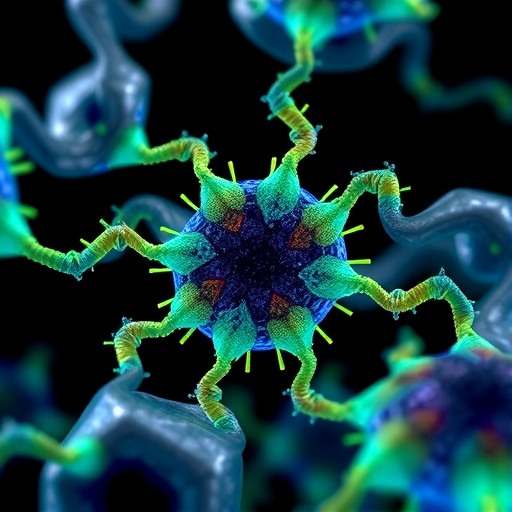In the rapidly evolving fields of biotechnology and medicine, the ability to accelerate the natural evolutionary process of proteins holds transformative potential for developing therapies and understanding biological mechanisms. Scientists at Scripps Research have now unveiled a pioneering synthetic biology platform that propels protein evolution at speeds thousands of times faster than found in nature itself. This groundbreaking system, named T7-ORACLE, leverages an innovative orthogonal replication mechanism to enable continuous hypermutation and accelerated evolution of proteins directly inside living bacterial cells.
The core innovation underpinning T7-ORACLE is the orthogonal replication system’s ability to achieve continuous, high-frequency mutagenesis focused on plasmids that harbor genes of interest. Through engineering the T7 DNA polymerase to be error-prone, researchers enable rapid and ongoing diversification of target proteins encoded on these plasmids without compromising host cell health. This decoupling of mutagenesis from the primary replication machinery circumvents common issues of genomic instability that plague other continuous evolution methods. As a result, the evolutionary process is synchronized with the bacterial division cycle, granting a new round of mutation and selection every approximately 20 minutes.
.adsslot_V71WIToEfj{width:728px !important;height:90px !important;}
@media(max-width:1199px){ .adsslot_V71WIToEfj{width:468px !important;height:60px !important;}
}
@media(max-width:767px){ .adsslot_V71WIToEfj{width:320px !important;height:50px !important;}
}
ADVERTISEMENT
Current continuous evolution platforms have suffered from either technical complexity or insufficient mutation rates, limiting their practical utility in labs. T7-ORACLE addresses these challenges by combining the advantages of the T7 bacteriophage replication system with the genetically tractable, fast-growing E. coli model organism. This fusion not only drastically accelerates evolutionary timelines but also seamlessly integrates with standard molecular biology workflows. The system’s scalability and ease of use hold promise for widespread adoption in protein engineering efforts across academic and industrial settings.
To exemplify the capabilities of T7-ORACLE, the researchers implemented a proof-of-concept experiment using the TEM-1 β-lactamase gene—a prototypical enzyme conferring antibiotic resistance. By subjecting E. coli cells harboring the orthogonal replication system and TEM-1 variants to continuously escalating doses of diverse antibiotics, the team observed rapid emergence of evolved enzyme variants capable of tolerating antibiotic levels up to 5,000 times greater than the ancestral form. Remarkably, many of the mutations identified during this accelerated evolution closely mirrored those documented in clinical isolates, underscoring the system’s fidelity in recapitulating real-world evolutionary trajectories. Some evolved variants even exhibited novel mutational combinations that enhanced resistance beyond known clinical benchmarks.
Despite using antibiotic resistance as a demonstrative model, the implications of T7-ORACLE extend far beyond microbial resistance studies. The platform’s modularity enables it to evolve virtually any protein of interest—from human enzymes to viral antigens—simply by integrating the corresponding genes into plasmids compatible with E. coli. This opens expansive avenues for engineering next-generation biotherapeutics, including highly selective antibodies and proteases tailored to degrade disease-related proteins in cancer and neurodegenerative pathways. The rapid timeframe from gene insertion to evolved protein facilitates accelerated discovery and optimization cycles, dramatically reducing development pipelines.
The broader vision for T7-ORACLE includes not only evolving proteins for improved or novel functions but also engineering entirely new biological polymers. Scientists involved envision extending the system to evolve specialized polymerases capable of replicating synthetic nucleic acids—chemical analogs of DNA and RNA with enhanced or altered properties. Such an advancement would usher in a new era of synthetic genomics, enabling the construction of organisms with fundamentally reprogrammed genetic architectures. This frontier remains largely unexplored but represents a tantalizing horizon for bioengineering and synthetic biology.
Importantly, the ease of implementing T7-ORACLE ensures accessibility for researchers already familiar with E. coli culture and standard molecular biology protocols. The platform does not require specialized equipment or complex workflows, lowering the barrier to entry for laboratories worldwide. This democratization of accelerated evolution technology could catalyze rapid advances across diverse areas of biomedical research, from drug development to environmental biocatalysis.
The development of T7-ORACLE reflects a paradigm shift in how scientists approach protein evolution. As co-senior author Pete Schultz articulates, the system acts as a “fast-forward button” on evolution, enabling the precise, continuous, and scalable generation of new protein variants with functional improvements. Co-senior author Christian Diercks reinforces that T7-ORACLE merges rational protein design principles with continuous evolution, creating a hybrid toolkit that will enhance efficiency in the discovery of therapeutic molecules.
Supported by funding from the National Institutes of Health, this study represents a milestone in synthetic biology and protein engineering. Its publication in Science signals broad recognition of the innovative methodology and its potential impact on medicine, research, and industrial biotechnology. As scientists continue to refine and expand T7-ORACLE, the system’s ability to rapidly produce specialized enzymes, antibodies, and other biologics could revolutionize approaches to treating cancer, neurodegeneration, and a myriad of human diseases.
Looking ahead, the research team at Scripps Research is focusing on applying T7-ORACLE to evolve human-derived enzymes for clinical use and to tailor proteases with enhanced specificity for cancer-associated proteins. These efforts aim to translate the platform’s accelerated evolutionary capability into tangible therapeutic applications, potentially speeding up drug development timelines and improving treatment efficacy. With T7-ORACLE, the promise of bringing evolution’s power directly into the laboratory has become a reality.
Subject of Research: Accelerated protein evolution using an orthogonal T7 plasmid replication system in Escherichia coli.
Article Title: An orthogonal T7 replisome for continuous hypermutation and accelerated evolution in E. coli.
News Publication Date: 7-Aug-2025.
Web References:
Science Article
Image Credits: Scripps Research.
Keywords: Proteins, Synthetic biology, Directed evolution, Hypermutation, E. coli, Orthogonal replication, Therapeutic enzymes, Antibiotic resistance, Protein engineering.
Tags: accelerated protein evolutiondirected evolution methodsEscherichia coli applicationsgenetic engineering breakthroughshigh-throughput mutagenesishypermutation techniquesscalable protein reprogrammingsynthetic biology advancementsT7-ORACLE platformtherapeutic protein developmenttransformative biotechnology solutionsvirus-derived DNA replication





